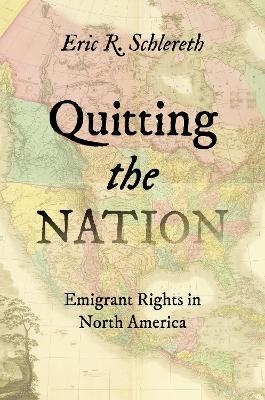
Quitting the Nation
Emigrant Rights in North America
Seiten
2024
The University of North Carolina Press (Verlag)
978-1-4696-7853-5 (ISBN)
The University of North Carolina Press (Verlag)
978-1-4696-7853-5 (ISBN)
Once the United States came into existence, its citizens immediately asserted rights to emigrate for political allegiances elsewhere. Quitting the Nation recovers this unfamiliar story by braiding the histories of citizenship and the North American borderlands to explain the evolution of emigrant rights between 1750 and 1870.
Perceptions of the United States as a nation of immigrants are so commonplace that its history as a nation of emigrants is forgotten. However, once the United States came into existence, its citizens immediately asserted rights to emigrate for political allegiances elsewhere. Quitting the Nation recovers this unfamiliar story by braiding the histories of citizenship and the North American borderlands to explain the evolution of emigrant rights between 1750 and 1870.
Eric R. Schlereth traces the legal and political origins of emigrant rights in contests to decide who possessed them and who did not. At the same time, it follows the thousands of people that exercised emigration right citizenship by leaving the United States for settlements elsewhere in North America. Ultimately, Schlereth shows that national allegiance was often no more powerful than the freedom to cast it aside. The advent of emigrant rights had lasting implications, for it suggested that people are free to move throughout the world and to decide for themselves the nation they belong to. This claim remains urgent in the twenty-first century as limitations on personal mobility persist inside the United States and at its borders.
Perceptions of the United States as a nation of immigrants are so commonplace that its history as a nation of emigrants is forgotten. However, once the United States came into existence, its citizens immediately asserted rights to emigrate for political allegiances elsewhere. Quitting the Nation recovers this unfamiliar story by braiding the histories of citizenship and the North American borderlands to explain the evolution of emigrant rights between 1750 and 1870.
Eric R. Schlereth traces the legal and political origins of emigrant rights in contests to decide who possessed them and who did not. At the same time, it follows the thousands of people that exercised emigration right citizenship by leaving the United States for settlements elsewhere in North America. Ultimately, Schlereth shows that national allegiance was often no more powerful than the freedom to cast it aside. The advent of emigrant rights had lasting implications, for it suggested that people are free to move throughout the world and to decide for themselves the nation they belong to. This claim remains urgent in the twenty-first century as limitations on personal mobility persist inside the United States and at its borders.
Eric R. Schlereth is associate professor of history at the University of Texas, Dallas.
| Erscheinungsdatum | 29.03.2024 |
|---|---|
| Reihe/Serie | The David J. Weber Series in the New Borderlands History |
| Zusatzinfo | 7 halftones, 5 maps |
| Verlagsort | Chapel Hill |
| Sprache | englisch |
| Maße | 155 x 235 mm |
| Gewicht | 272 g |
| Themenwelt | Geisteswissenschaften ► Geschichte ► Regional- / Ländergeschichte |
| Recht / Steuern ► EU / Internationales Recht | |
| Recht / Steuern ► Öffentliches Recht ► Besonderes Verwaltungsrecht | |
| Sozialwissenschaften ► Soziologie | |
| ISBN-10 | 1-4696-7853-5 / 1469678535 |
| ISBN-13 | 978-1-4696-7853-5 / 9781469678535 |
| Zustand | Neuware |
| Informationen gemäß Produktsicherheitsverordnung (GPSR) | |
| Haben Sie eine Frage zum Produkt? |
Mehr entdecken
aus dem Bereich
aus dem Bereich


